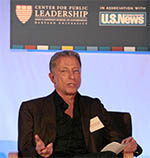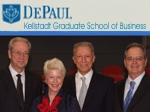FINANCIAL TIMES, April 28, 2012
Excerpts from The FT's Management Editor Andrew Hill on Erhard and Jensen:
"Werner Erhard and Michael Jensen look an unlikely pairing but their leadership teaching fits into a broad stream of business education and research about ethics and integrity. "
"In 'A Positive Theory of the Normative Virtues', the draft introduction to their forthcoming book, they write that their desire to confront their own “personal contributions to the mess generated by out-of-integrity behaviour” was one trigger for their research. But it was the Enron scandal of 2001 that prompted business schools to refocus attention on this area. The financial crisis of 2008-2009 gave this effort new impetus, as management schools realised they had to bear some responsibility for the bad corporate behaviour of their alumni. "
"Jensen and Erhard’s latest work shifts the emphasis away from external incentives and structures to leaders’ internal motivation, encouraging self-examination and personal action. Whatever the strengths and weaknesses of this approach, managers seem to have an appetite for it. Another eminent Harvard professor, Clay Christensen – one of whose HBS classmates was the disgraced Enron chief executive Jeff Skilling – is about to publish a book, How Will You Measure Your Life?, offering advice on how to build a successful life and career that avoids ethical compromise. The 2010 Harvard Business Review article on which it is based is one of the best-read in the journal’s history."
Andrew Hill is the management editor of the Financial Times. He is a former City editor, financial editor and comment and analysis editor. He joined the FT in 1988 and has also worked as New York bureau chief, foreign news editor and correspondent in Brussels and Milan. Hill was named Commentator of the Year at the 2009 Business Journalist of the Year Awards, where he also received a Decade of Excellence award.
Excerpts from: Lunch With The FT: Werner Erhard
"Erhard is the man who more or less invented the personal growth movement in California in the early 1970s and who coined the phrase, 'Thank you for sharing'."
"Erhard’s influence extends far beyond the couple of million people who have done his courses: there is hardly a self-help book or a management training programme that does not borrow some of his principles."
"I’m not the first person to struggle to grasp his ideas. Erhard tells me that paramilitaries in Northern Ireland had a bit of trouble too, but when they did get it they disarmed as a result. He also worked with members of the first Russian parliament in 1993, who were apparently even slower getting the point than me."
"Erhard is an autodidact. Jensen is an emeritus professor at Harvard Business School. Together they are writing academic articles and touring the world’s best universities."
"What got the two started on this [integrity] was not the usual stuff about corporate scandals. It was reflecting on how their own “out-of-integrity behaviour”, had stunted their own performance and damaged themselves and others around them. After seven years of research the upshot is a (somewhat impenetrable) model that links integrity, morality, ethics and legality into a single system that promises great benefits for everyone."
Lucy Kellaway is the FT’s management columnist for the Financial Times
Werner Erhard and Michael Jensen’s book on integrity is forthcoming from Cambridge University Press
Read the full article in the Financial Times
Werner Erhard on the Internet |
|---|
Werner Erhard's
Academic Papers
| Werner Erhard's Curriculum Vitae |
|---|

Warren Bennis commented: "Lucy Kellaway over lunch 'got' as much of the fullness, the essence of the person I have known for over a half-century. She did it beautifully, personalizing Werner's abstractions, by 'being in integrity', with her asides and her questions. I've known Werner for almost 4 decades and with a variety of lenses and different angles. An enormously gifted person, singular at that, and as sensitive as I like to think I am, it took me awhile and a leap into the unknown to get the fullness of him. I'm not talking about my admiration for the lives he's illuminated the paths for and the concrete steps his educational programs have achieved to serve as guides for the thousands." |


